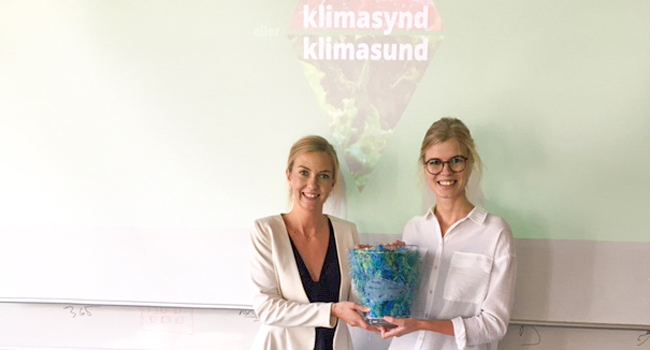The prize is awarded in appreciation of an excellent and innovative answer to a problem within MÆRKK's subject area. MÆRKK is a knowledge group at the Department of Communication and Psychology that deals with aesthetics in relation to communication, culture and cognition.
The winner of this year's MÆRKK award is Asta Justesen and Sofie Wamberg Broch for the thesis "Climate sin or climate sound". The thesis focuses on how climate and health considerations appear in communication about food, and how the overlap between them is expressed. The thesis is based on the Food Pyramid as a case.
Iben Bredahl Jessen, who supervised the thesis, says:
The thesis demonstrates in an exemplary way the role of communication professionalism in an interdisciplinary field. Through systematic analyzes of text and images in Coop's communication about the Food Pyramid from 1976 to 2019, the thesis contributes with an insightful discussion of dissemination issues related to communication about climate and health in context. The thesis is distinguished by a historical look at the Food Pyramid's communicative and aesthetic features, which are used to shed light on current dissemination issues in relation to climate and health in a societal context.
About the Thesis: Climate sin or climate sound
This master’s thesis examines how overlaps between considerations towards both health and climate change appear in communication regarding food. Furthermore, it investigates how the overlap is articulated. The food pyramid mirrors changes in food culture, which is dependent on context and the culturally shaped reality and social frame of reference. We conclude that the two-way consideration regards mutual influence which means that food which is beneficial for the individual health also helps mitigate climate change. Therefore, a communicative appeal to the health of the individual can cause advantageous impact on collective societal problems such as climate change and public health.
Health and climate change are of current interest and have societal relevance, and our literature review determines the importance of a humanistic perspective on problems related to climate change and health because this research field is limited. We narrow our focus to supermarket communication in a Danish context and Coop is our case. Coop’s food pyramid is the pivotal point, and our data consists of Coop’s web communication on this subject. We examine how Coop visually and linguistically communicates, and we apply multimodal theory. Moreover, the thesis relies on Stuart Hall’s model of communication e.g. to reflect on potential ways of decoding the encoded messages. Furthermore, the problem is examined through legitimation strategies and topoi used in the communication to legitimize the content and the organization in general. The master’s thesis applies social constructivism as theory of science to examine the reality and knowledge Coop state regarding climate and health. Additionally, we research into which social constructions are related to food, food culture, eating habits, health, and climate issues.
The analysis is divided into three sections. In the first part the master’s thesis examines the historical development of the food pyramid. Secondly, it looks at the 2019 food pyramid in the light of the edition from 1976. And finally, the third part focuses on how Coop communicates consideration towards climate. In the first analysis the thesis determines that the food pyramid reflects how Danish food culture has changed over time, just like it seems to have potential to maintain or influence it as well. Furthermore, we conclude that consideration towards health has been a part of Coop’s reality in regard to all food pyramids. A new reality concerning food appears in 2019, which means that healthy food also includes a concern towards climate. Hence, the food pyramid integrates a two-way consideration to both body and climate in Danish food culture. What is beneficial for you, is also beneficial for the climate and vice versa. The thesis concludes that Coop makes a virtue of articulating that a given food or action benefits health and climate simultaneously. The overlap is communicated visually and linguistically, and the study establishes different examples of multimodal interaction. Sometimes the communication has an aesthetic dimension, but mostly we infer the communication to be informative and guiding, because Coop provides informative knowledge about climate-friendly and healthy food. Coop mainly appeals to the receiver's egoistic needs rather than altruistic motives, which is why we draw the conclusion that Coop add most importance to the individual, just like the benefit of health is prioritized. In 2019 it is noteworthy that Coop stresses that individuals can potentially mitigate climate changes by making minor changes in everyday life regarding food consumption. However, when it comes to meat consumption Coop articulates consideration towards health and climate as a shared national responsibility, and this indicates that Coop looks upon it as a barrier to change Danish food culture.
Common features about considerations towards climate and health regard appropriate choices to avoid unwanted consequences. We conclude that Coop does not focus on the unwanted factors with an alarming rhetoric, but instead Coop articulates how the consumer can achieve positive aspects. The master's thesis determines a predominance of authorization and moral evaluation as legitimation strategies. Among other things Coop includes experts, guidelines and reference to custom which combined establishes trustworthiness, and it makes Coop seem like an organization that adds importance to transparency. These communicative acts contribute to justify the food pyramid and protect Coop’s organizational legitimation. Finally the master's thesis discusses some of the challenges worth paying attention to when communicating about the overlap between climate change and health. Furthermore, it discusses how Coop takes societal responsibility.
Asta Justesen and Sofie Wamberg Broch's thesis can be read here (in Danish)

